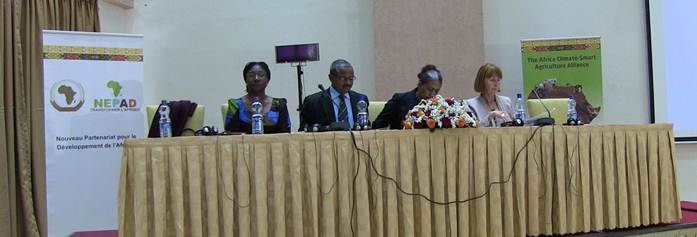Africa Climate-Smart Agriculture Alliance Launched

“The Africa Climate-Smart Agriculture Alliance is the first such continental platform following the 2014 Malabo Declaration for mainstreaming climate change in agriculture,” said Mrs Estherine Fotabong, NEPAD Programmes Director, at the first Africa CSA Alliance Forum that took place in Addis Ababa, Ethiopia, on May 13.
Climate Smart Agriculture (CSA) is agriculture that sustainably increases productivity, resilience and adaptation, as well as contributes towards reducing the emission of greenhouse gases. It therefore leads to overall food security and nutrition in the face of climate change. Mrs Fotabong emphasised the importance of building capacity at all levels, especially for smallholder farmers and institutions in order to attain the goal of 25 million African farmers practising climate-smart agriculture by 2025.
Mrs Fotabong also stated that the Africa CSA Alliance needs to recognise interventions that respond to both the challenges and opportunities that climate change brings. “In order to make rural transformation attainable, climate change needs to be also mainstreamed in the Comprehensive Africa Agriculture Development Programme (CAADP), Africa’s instrument for agricultural growth and economic development,” Mrs Fotabong said.

Mrs Fotabong with H.E Ato Sileshi Getahum ( Ethiopian State Minister for Agriculture)Hon Zenevu Tadesse, Minister for Women, Children & Youth Affairs;Minister Councillor Ms Tove Stub, Norwegian Embassy, Addis Ababa
At the 31st African Union Summit (Malabo, June 2014) the Heads of State and Government were clear in their resolve to commit to action on the agriculture-climate change nexus issue. In the Summit Decisions on NEPAD, the Heads of State and Government endorsed the NEPAD programme on agriculture climate change including its components on women empowerment, intensified support to small-holder farmers and the setup of an African Climate Smart-Agriculture Coordination Platform as means in pursuit of what was endorsed as the African Union Vision to have at least 25 million farm households practicing CSA by 2025.
To achieve this, Africa is leading a country-driven and regionally-integrated Initiative that will provide the tools for action and platform for partnerships that will deliver results. Centred on NEPAD, the initiative will be fully aligned with and an integral part of the CAADP framework, as well as cultivating the necessary multi-sectorial engagements, including the environment, natural resources and climate change policies and programmes.
To support countries, a virtual and physical African Alliance was established where knowledge is exchanged to identify best practice and partnerships across stakeholder groups are catalysed. The Alliance will also foster a coherent African CSA Agenda as well as sustaining the collective power and urge for action. It will also facilitate assessment of individual (country, region, sector, etc.) performance against continental and even global benchmarks.
Ethiopian State Minister for Agriculture, Sileshi Getahun stated that the Africa CSA Alliance provides an opportunity to take concrete action in climate change for the benefit of African agriculture. "The field trip for participants at the Forum to Ethiopian projects will enable them to witness first-hand the interventions in climate-smart agriculture in the Ethiopian national strategy. We need to show the rest of the world our adaptive capacity and up-scale such practices," Mr Getahun said.
Minister for Women, Children and Youth Affairs, Zenevu Tadesse called on all stakeholders – including governments, civil society and private sector - to support local systems and expand to scale up climate-smart agriculture. The Minister stressed that the Africa CSA Alliance is a very important instrument towards achieving climate-smart agriculture in Africa.
Minister Councillor Tove Stub of the Norwegian Embassy in Addis Ababa, maintained that the Africa CSA Alliance is an important milestone following the 2014 Malabo Declaration in dealing with the challenges of climate change for the benefit of smallholder farmers.
Launched as Africa’s Strategic Approach for Food Security & Nutrition in the Face of Climate Change, the Africa CSA Alliance was attended by about 150 representatives and participants from Governments, Regional Economic Communities, Farmers’ Organisations, Private Sector, Civil Society, specialised agencies and development partners.
